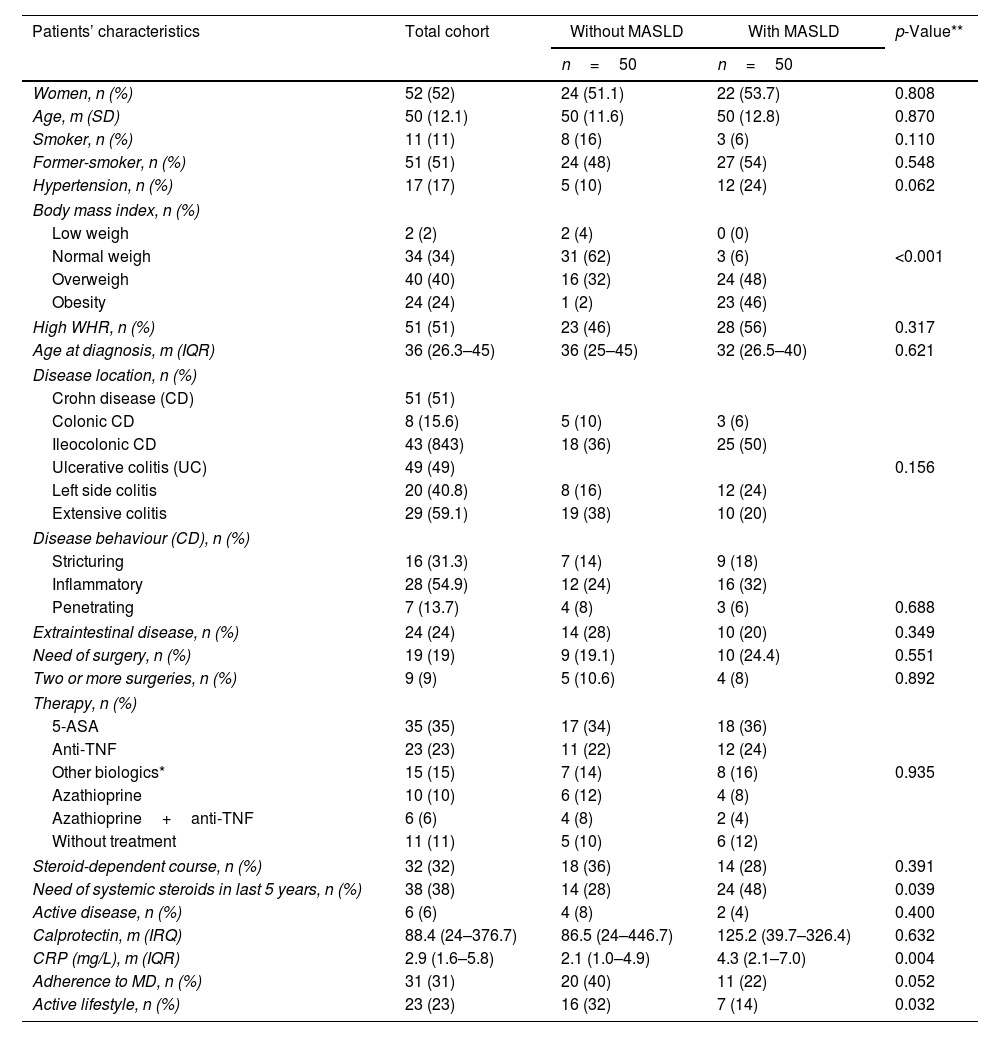Inflammatory bowel disease (IBD) has been reported to increase the risk of early atherosclerosis even in young patients. Moreover, metabolic dysfunction-associated steatotic liver disease (MASLD), which has been linked to IBD, is a well-recognized but underdiagnosis entity related to cardiovascular risk. We analyze the impact of MASLD in IBD patients’ cardiovascular risk through both advanced lipoprotein profile sorted by nuclear magnetic resonance spectroscopy, and carotid artery intima-media thickness (CIMT).
MethodsCross-sectional cohort study which involves 941 IBD adult outpatients. Of them, 50 patients with IBD who met criteria for MASLD and 50 with IBD without MASLD, matched by sex and age were included. Alterations in CIMT were evaluated considering abnormal measures above the 75th percentile adjusted for sex and age. Specific advanced lipoprotein profile was also carried out.
ResultsMost of the patients had an abnormal CIMT (58%). MASLD (OR=5.05, CI 95%=1.71–14.92) and female sex (OR=3.32, CI 95%=1.03–10) were significantly associated with CIMT alterations. Dense LDL particles (with high cholesterol composition in general cohort (OR=3.62, 95% CI=1.07–12.19) and high triglycerides density in young subgroup (OR=6.25, 95% CI=1.04–50) but not total LDL cholesterol were associated with CIMT alterations.
ConclusionsMASLD and female sex are associated with early atherosclerosis in IBD patients. Dense LDL particle in combination with vascular imaging findings should be evaluated as non-invasive tools in the management of cardiovascular risk in IBD patients.
Se ha descrito que la enfermedad inflamatoria intestinal (EII) incrementa el riesgo de aterosclerosis precoz incluso en pacientes jóvenes. Además, la esteatosis hepática metabólica (MASLD), entidad relacionada con la EII, es una causa reconocida pero infradiagnosticada de riesgo cardiovascular. Hemos analizado el impacto de MASLD en el desarrollo de enfermedades cardiovasculares en los pacientes con EII a través de un estudio avanzado del perfil de lipoproteínas con espectroscopia por resonancia magnética nuclear y el grosor íntima-media carotídeo (GIMc).
MétodosSe trata de un estudio de cohortes transversal de 941 pacientes ambulatorios con EII. De ellos, se incluyeron 50 con EII que cumplían criterios de MASLD y otros 50 con EII sin MASLD emparejados por sexo y edad. Se evaluaron las alteraciones de GIMc considerando patológicos aquellos valores por encima del percentil 75 ajustado por sexo y edad. Se analizó también el perfil avanzado de lipoproteínas.
ResultadosMuchos de los pacientes tuvieron un GIMc alterado (58%). La presencia de MASLD (odds ratio [OR]=5,05, intervalo de confianza [IC] 95%=1,71-14,92) y el sexo femenino (OR=3,32, IC 95%=1,03-10), se asociaron significativamente a las alteraciones de GIMc. Las partículas de baja densidad (LDL) (con alta concentración de colesterol en la cohorte general [OR=3,62, IC 95%=1,07-12,19], así como de de triglicéridos en el subgrupo de pacientes jóvenes [OR=6,25, IC 95%=1,04-50]), pero no las cifras de colesterol LDL total, se asociaron a alteraciones en el GIMc.
ConclusionesLa presencia de MASLD y el sexo femenino se asocian a aterosclerosis precoz en los pacientes con EII. El estudio de las partículas LDL densas en combinación con los hallazgos en las pruebas de imagen vascular, deberían valorarse como herramientas no invasivas de detección de riesgo cardiovascular en los sujetos con EII.










